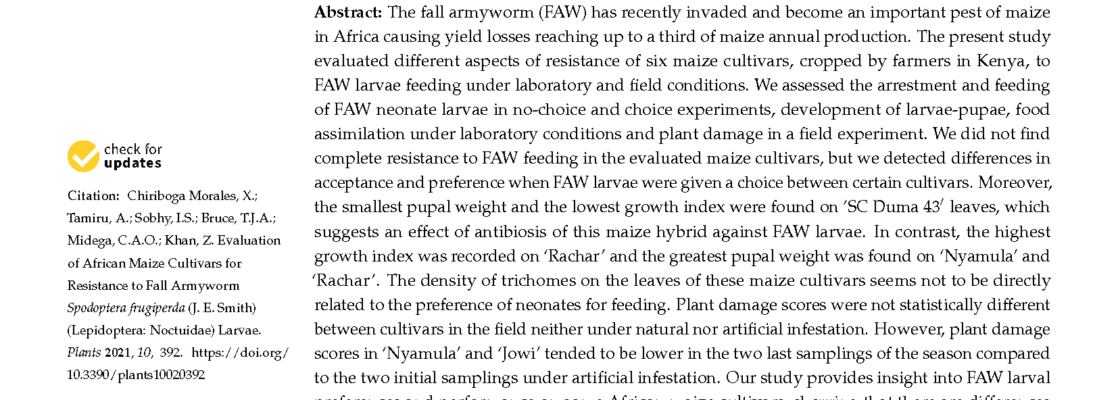The fall armyworm (FAW) has recently invaded and become an important pest of maize in Africa causing yield losses reaching up to a third of maize annual production. The present study evaluated different aspects of resistance of six maize cultivars, cropped by farmers in Kenya, to FAW larvae feeding under laboratory and field conditions. We assessed the arrestment and feeding of FAW neonate larvae in no-choice and choice experiments, development of larvae-pupae, food assimilation under laboratory conditions and plant damage in a field experiment. We did not find complete resistance to FAW feeding in the evaluated maize cultivars, but we detected differences in acceptance and preference when FAW larvae were given a choice between certain cultivars. Moreover, the smallest pupal weight and the lowest growth index were found on ’SC Duma 430 leaves, which suggests an effect of antibiosis of this maize hybrid against FAW larvae. In contrast, the highest growth index was recorded on ‘Rachar’ and the greatest pupal weight was found on ‘Nyamula’ and ‘Rachar’. The density of trichomes on the leaves of these maize cultivars seems not to be directly related to the preference of neonates for feeding. Plant damage scores were not statistically different between cultivars in the field neither under natural nor artificial infestation. However, plant damage scores in ‘Nyamula’ and ‘Jowi’ tended to be lower in the two last samplings of the season compared to the two initial samplings under artificial infestation. Our study provides insight into FAW larval preferences and performance on some African maize cultivars, showing that there are differences between cultivars in these variables; but high levels of resistance to larvae feeding were not found.
Authors: Xavier Chiriboga Morales, Amanuel Tamiru, Islam S. Sobhy, Toby J. A. Bruce, Charles A. O. Midega and Zeyaur Khan
Contact address: atamiru@icipe.org
Institution: International Centre of Insect Physiology and Ecology (icipe), P.O. Box 30772-00100, Nairobi, Kenya;
Twitter name of the institution: @icipe
Twitter link: https://x.com/icipe
Available downloads:


